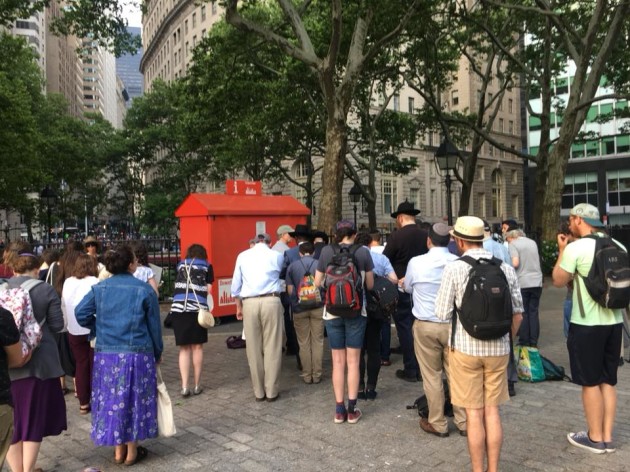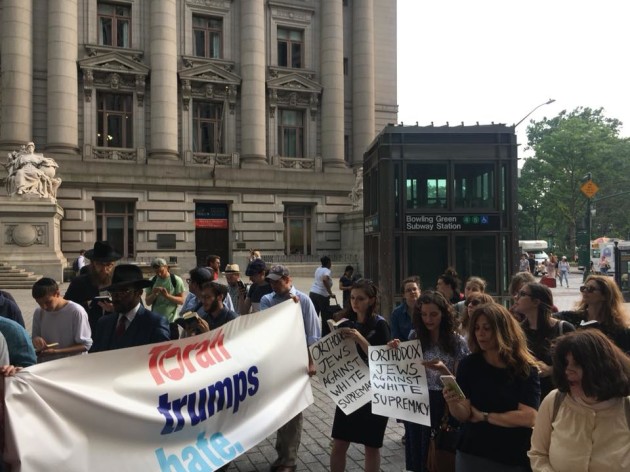
by Rebecca Krevat
Why We’re Protesting the Orthodox Union Every Monday
 Keeping Kashrut, or kosher, is one of the most central and recognizable pillars of observant Judaism. As a child in a traditional but modern Orthodox community, I was taught the importance of keeping kosher. Even when I was a toddler, I asked my Orthodox uncle if his house was kosher before feeling comfortable eating there. For our family, food products needed kosher symbols. At the grocery store, families like ours all across the country scan products for the “OU” symbol from the Orthodox Union—one of the most widely recognized and trustworthy of the kosher symbols.
Keeping Kashrut, or kosher, is one of the most central and recognizable pillars of observant Judaism. As a child in a traditional but modern Orthodox community, I was taught the importance of keeping kosher. Even when I was a toddler, I asked my Orthodox uncle if his house was kosher before feeling comfortable eating there. For our family, food products needed kosher symbols. At the grocery store, families like ours all across the country scan products for the “OU” symbol from the Orthodox Union—one of the most widely recognized and trustworthy of the kosher symbols.
The Orthodox Union is an umbrella organization representing Orthodox synagogues and communities across the United States. In addition to telling the community what foods are permissible to eat, the OU runs programs that keeps the organization deeply rooted in Orthodox communities, including youth groups and support on campus. The OU is a significant component of the blood in the veins of the Orthodox communal world.
I didn’t even realize the OU did any political work outside of their communal support until 2014, when I noticed that they had commended the Supreme Court’s decision siding with Hobby Lobby in a notorious case regarding an employer’s responsibility to provide insurance inclusive of contraception, as mandated by the Affordable Care Act. They sided with the evangelical Christian plaintiffs in that case, even though President Obama had already ensured that any company that was not comfortable paying for contraception could employ a provision so the government would pay for it instead.
I was shocked. What business did the OU have getting involved in the agency of an individual to make choices about healthcare? Judaism has a radically different perspective on reproduction than the Christian right. Many of the women in my community used contraception, so for the OU to take this position claiming “religious liberty” when our religion allows for birth control use (granted, in certain contexts; for example, Orthodox Judaism generally forbids pre-marital sex), seemed bizarre.
The OU Advocacy group continues to take only conservative positions. Recently, they celebrated the Supreme Court decision in the Masterpiece Cakeshop v. Colorado Civil Rights Commission, and actually referred to homosexuality as a “cultural fad” (this piece was removed without apology from the organization). The OU demands that member synagogues follow their lead. For instance, when an OU member synagogue included an announcement wishing a same-sex couple a mazel tov on their impending nuptials, the OU condemned the synagogue.
All of this is to say that it was utterly unsurprising, but still distressing, for the OU to host Attorney General Jeff Sessions at the same time as he announced that domestic violence will no longer be an acceptable reason for immigrants to be granted asylum in this country, and families seeking the same will be separated upon arrival into the U.S. There have been reports of babies as young as eight months being separated, and one report shows a baby taken literally from her mother’s breast. Despite an executive order allegedly ending the practice, confusion still reigns: children are being removed to already overcrowded facilities all across the country. It’s hard to imagine the trauma these children and their families are enduring, so deep that I hardly know how to write about it. So it’s understandable to see Jews and others making comparisons to Nazi Germany, where children were also separated from their families, sometimes in an attempt to save them.
Many Orthodox Jews in particular were furious at the OU’s apparent endorsement of Sessions, and insult was added to injury when the OU leadership was seen in a photograph with him, holding a plaque that said “Tzedek tzedek tirdof.” “Justice, justice you shall pursue,” a well-known quote from the Torah that inspires Jewish social justice movements globally. Orthodox groups like Torah Trumps Hate and the group I co-founded, Hitoreri: An Orthodox Movement for Social Justice, sprung into action. We expressed dismay on the OU’s Facebook page, reached out to our rabbis to let them know of our anger, and finally, we arranged to daven mincha, praying the afternoon prayer service, in front of the OU Manhattan offices as an act of protest and a call to conscience.
About a day or so before the first protest, the OU joined almost 30 other Jewish organizations in a letter to condemn the family separation policy. This was a good result, but words aren’t enough. While we celebrate the rare fact of all four major branches of Judaism speaking out against the inhumanity of separating immigrant children from their family members, we demand more than an exercise in crisis control. This week Hitoreri continued to host Moral Minchas in front of the OU’s New York and D.C. headquarters, and plan to every Monday until Tisha B’av.
Participating in these protests has made me feel grateful that many members of my Orthodox community see our Torah as a document that is meant to be lived, and not simply studied and intellectualized. When the Torah calls on us 36 times not to oppress the stranger, we know that it is a mitzvah that we must fulfill – just as we keep kosher. We will call on our leaders to do everything in their power to do so. Our goal is to persuade the OU to use their resources and large network of devoted synagogues to speak out in public, not only to promise to work with legislators behind closed doors. They need to take a stand. A few clicks into the OU’s action center you will find many ways to support federal funding for private schools, but not a single proactive way to push back against this administration’s monstrous behavior at our border.
When we stand outside their doors on Mondays, we are saying: Orthodox Union, your constituency demands better. We were immigrants. Many of our ancestors were horribly wronged by this country as they sought asylum. Let’s ensure our country does not make that dangerous mistake again.